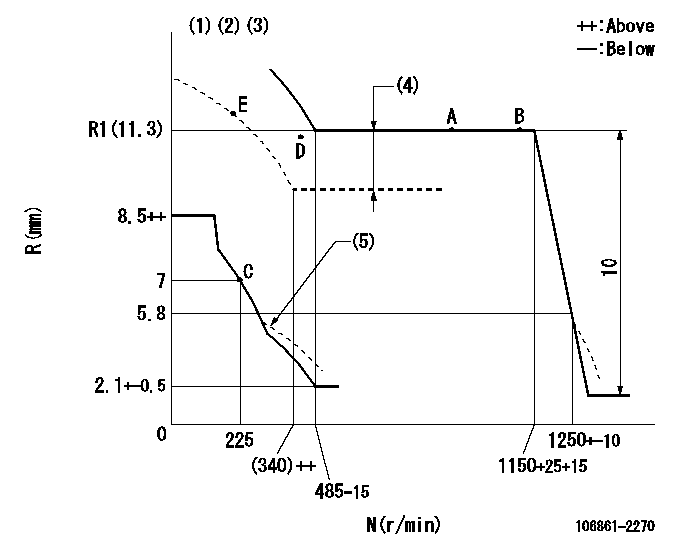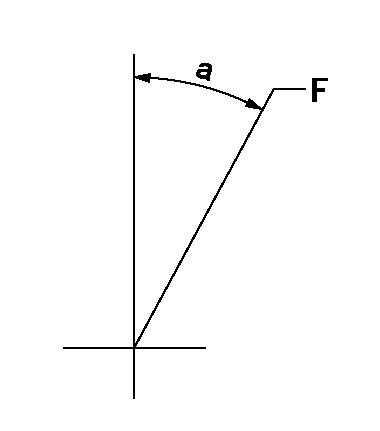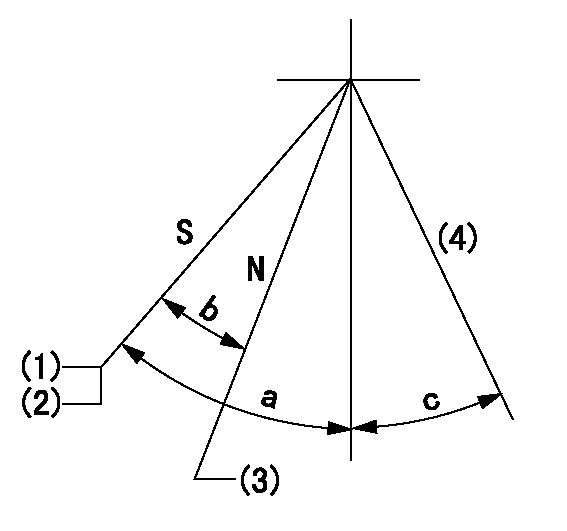Information injection-pump assembly
ZEXEL
106861-2270
1068612270

Rating:
Service parts 106861-2270 INJECTION-PUMP ASSEMBLY:
1.
_
7.
COUPLING PLATE
8.
_
9.
_
11.
Nozzle and Holder
ME066565
12.
Open Pre:MPa(Kqf/cm2)
17.7{180}/21.6{220}
15.
NOZZLE SET
Include in #1:
106861-2270
as INJECTION-PUMP ASSEMBLY
Cross reference number
ZEXEL
106861-2270
1068612270
Zexel num
Bosch num
Firm num
Name
Calibration Data:
Adjustment conditions
Test oil
1404 Test oil ISO4113 or {SAEJ967d}
1404 Test oil ISO4113 or {SAEJ967d}
Test oil temperature
degC
40
40
45
Nozzle and nozzle holder
105780-8140
Bosch type code
EF8511/9A
Nozzle
105780-0000
Bosch type code
DN12SD12T
Nozzle holder
105780-2080
Bosch type code
EF8511/9
Opening pressure
MPa
17.2
Opening pressure
kgf/cm2
175
Injection pipe
Outer diameter - inner diameter - length (mm) mm 8-3-600
Outer diameter - inner diameter - length (mm) mm 8-3-600
Overflow valve
131424-4620
Overflow valve opening pressure
kPa
255
221
289
Overflow valve opening pressure
kgf/cm2
2.6
2.25
2.95
Tester oil delivery pressure
kPa
157
157
157
Tester oil delivery pressure
kgf/cm2
1.6
1.6
1.6
Direction of rotation (viewed from drive side)
Right R
Right R
Injection timing adjustment
Direction of rotation (viewed from drive side)
Right R
Right R
Injection order
1-2-7-3-
4-5-6-8
Pre-stroke
mm
4.8
4.75
4.85
Beginning of injection position
Governor side NO.1
Governor side NO.1
Difference between angles 1
Cyl.1-2 deg. 45 44.5 45.5
Cyl.1-2 deg. 45 44.5 45.5
Difference between angles 2
Cal 1-7 deg. 90 89.5 90.5
Cal 1-7 deg. 90 89.5 90.5
Difference between angles 3
Cal 1-3 deg. 135 134.5 135.5
Cal 1-3 deg. 135 134.5 135.5
Difference between angles 4
Cal 1-4 deg. 180 179.5 180.5
Cal 1-4 deg. 180 179.5 180.5
Difference between angles 5
Cal 1-5 deg. 225 224.5 225.5
Cal 1-5 deg. 225 224.5 225.5
Difference between angles 6
Cal 1-6 deg. 270 269.5 270.5
Cal 1-6 deg. 270 269.5 270.5
Difference between angles 7
Cal 1-8 deg. 315 314.5 315.5
Cal 1-8 deg. 315 314.5 315.5
Injection quantity adjustment
Adjusting point
-
Rack position
11.3
Pump speed
r/min
700
700
700
Each cylinder's injection qty
mm3/st.
137
132.9
141.1
Basic
*
Fixing the rack
*
Standard for adjustment of the maximum variation between cylinders
*
Injection quantity adjustment_02
Adjusting point
C
Rack position
7+-0.5
Pump speed
r/min
225
225
225
Each cylinder's injection qty
mm3/st.
18.5
16
21
Fixing the rack
*
Standard for adjustment of the maximum variation between cylinders
*
Injection quantity adjustment_03
Adjusting point
A
Rack position
R1(11.3)
Pump speed
r/min
700
700
700
Average injection quantity
mm3/st.
137
136
138
Basic
*
Fixing the lever
*
Boost pressure
kPa
33.3
33.3
Boost pressure
mmHg
250
250
Injection quantity adjustment_04
Adjusting point
D
Rack position
11.3
Pump speed
r/min
400
400
400
Average injection quantity
mm3/st.
130
126.3
133.7
Fixing the lever
*
Boost pressure
kPa
12.7
12.7
12.7
Boost pressure
mmHg
95
95
95
Injection quantity adjustment_05
Adjusting point
E
Rack position
-
Pump speed
r/min
200
200
200
Average injection quantity
mm3/st.
120
100
140
Fixing the lever
*
Boost pressure
kPa
0
0
0
Boost pressure
mmHg
0
0
0
Boost compensator adjustment
Pump speed
r/min
400
400
400
Rack position
9.9
Boost pressure
kPa
2
2
2
Boost pressure
mmHg
15
15
15
Boost compensator adjustment_02
Pump speed
r/min
400
400
400
Rack position
11.3
Boost pressure
kPa
12.7
11.4
14
Boost pressure
mmHg
95
85
105
Boost compensator adjustment_03
Pump speed
r/min
400
400
400
Rack position
(12.5)
Boost pressure
kPa
20
20
20
Boost pressure
mmHg
150
150
150
Timer adjustment
Pump speed
r/min
980--
Advance angle
deg.
0
0
0
Remarks
Start
Start
Timer adjustment_02
Pump speed
r/min
(900)
Advance angle
deg.
0
0
0
Timer adjustment_03
Pump speed
r/min
1050
Advance angle
deg.
3
2.5
3.5
Remarks
Finish
Finish
Test data Ex:
Governor adjustment

N:Pump speed
R:Rack position (mm)
(1)Lever ratio: RT
(2)Target shim dimension: TH
(3)Boost compensator cancel stroke: BSL
(4)Boost compensator stroke: BCL
(5)Damper spring setting: DL
----------
RT=1 TH=2.7mm BSL=1.6mm BCL=1.4+-0.1mm DL=5.8-0.2mm
----------
----------
RT=1 TH=2.7mm BSL=1.6mm BCL=1.4+-0.1mm DL=5.8-0.2mm
----------
Speed control lever angle

F:Full speed
----------
----------
a=18deg+-5deg
----------
----------
a=18deg+-5deg
0000000901

F:Full load
I:Idle
(1)Stopper bolt setting
----------
----------
a=10deg+-5deg b=32.5deg+-3deg
----------
----------
a=10deg+-5deg b=32.5deg+-3deg
Stop lever angle

N:Pump normal
S:Stop the pump.
(1)Rack position = aa
(2)Stopper bolt setting
(3)Rack position bb
(4)Free (at shipping)
----------
aa=4.7-0.5mm bb=15.3mm
----------
a=43deg+7deg-5deg b=30deg+-5deg c=(10.5deg)
----------
aa=4.7-0.5mm bb=15.3mm
----------
a=43deg+7deg-5deg b=30deg+-5deg c=(10.5deg)
0000001501 MICRO SWITCH
Adjustment of the micro-switch
Adjust the bolt to obtain the following lever position when the micro-switch is ON.
(1)Speed N1
(2)Rack position Ra
----------
N1=325+-5r/min Ra=6.7mm
----------
----------
N1=325+-5r/min Ra=6.7mm
----------
Timing setting

(1)Pump vertical direction
(2)Coupling's key groove position at No 1 cylinder's beginning of injection
(3)-
(4)-
----------
----------
a=(40deg)
----------
----------
a=(40deg)
Information:
Lubrication Specifications
Crankcase Lubricating Oils
Use oils which meet Engine Service Classification CD (MIL-L-2104D) or CD/TO-2. These are additive-type oils that have been approved for use in Caterpillar Diesel Engines.Consult the "EMA Lubricating Oils Data Book," Form SEBU5939, for a listing of CD oil brands.The proper SAE grade of oil to select is determined by the ambient temperature at which the engine is started and the maximum ambient temperature in which the engine will be operating. See chart for recommended viscosity and temperature range.To determine if the oil in the crankcase will flow in cold weather, remove the oil dipstick before starting. If the oil will flow off, the oil is fluid enough to circulate properly.Lubricating Grease
Use Multipurpose-type Grease (MPGM) which contains 3-5% molybdenum disulfide conforming to MIL-M-7866, and a suitable corrosion inhibitor. NLGI No. 2 Grade is suitable for most temperatures. Use NLGI No. 0 or No. 1 Grade for extremely low temperatures.Recommended Lubricant Viscosities
Air Starting Motor Oiler: Use SAE 10W in all temperatures.Flywheel Clutch Bearing Reservoir: Use SAE 30 in all temperatures. Fuel Specifications
No. 2 fuel oil and No. 2D diesel fuel are recommended for use in Caterpillar Diesel Engines. In extreme cold temperatures use No. 1 fuel oil or No. 1D diesel fuel.In selecting a fuel, note that distillate fuels are especially desirable because the fuel is heated to a vaporous state and condensed, thus eliminating all sediment and residue.There is considerable variation in the composition of fuels distributed under the No. 2 grade classifications. For desirable engine service it is most important to give special attention to cetane no., water and sediment, pour point, cloud point and sulphur content. USE THE LOWEST PRICE DISTILLATE FUEL WHICH MEETS THE FOLLOWING REQUIREMENTS.Water and Sediment 0.1% sedimentCetane No. (PC Engine) 35 minimum(DI Engine) 40 minimumPour Point 10°F (6°C) below ambient temperatureCloud Point No higher than ambient temperatureSulphur Content* Adjust oil change periodGravity 32-40 A.P.I. at 60°F (15.6°C)*See the topic SULPHUR CONTENT. Cetane No: This is an indication of a fuel's ignition quality and should not be less than 35 for the PC engine and 40 for the DI engine. For high altitude operation or cold weather starting, a higher cetane number is required. Water and Sediment: A good clean fuel will contain no more than 0.1% sediment and water. Dirty fuels lead to early filter plugging and in addition can result in the formation of gums and resins reducing filter and engine life. Pour Point: The pour point of the fuel has no effect on engine performance, as long as the fuel is fluid enough to flow from the fuel tank to the engine. The pour point of the fuel should be at least 10°F (6°C) below the lowest atmospheric temperature at which the engine must start and operate. In extremely cold temperatures it may be necessary to use No. 1 fuel oil or No. 1D diesel fuel. Cloud Point: Cloud point is the temperature at which wax crystals become visible and is generally above the pour point of
Crankcase Lubricating Oils
Use oils which meet Engine Service Classification CD (MIL-L-2104D) or CD/TO-2. These are additive-type oils that have been approved for use in Caterpillar Diesel Engines.Consult the "EMA Lubricating Oils Data Book," Form SEBU5939, for a listing of CD oil brands.The proper SAE grade of oil to select is determined by the ambient temperature at which the engine is started and the maximum ambient temperature in which the engine will be operating. See chart for recommended viscosity and temperature range.To determine if the oil in the crankcase will flow in cold weather, remove the oil dipstick before starting. If the oil will flow off, the oil is fluid enough to circulate properly.Lubricating Grease
Use Multipurpose-type Grease (MPGM) which contains 3-5% molybdenum disulfide conforming to MIL-M-7866, and a suitable corrosion inhibitor. NLGI No. 2 Grade is suitable for most temperatures. Use NLGI No. 0 or No. 1 Grade for extremely low temperatures.Recommended Lubricant Viscosities
Air Starting Motor Oiler: Use SAE 10W in all temperatures.Flywheel Clutch Bearing Reservoir: Use SAE 30 in all temperatures. Fuel Specifications
No. 2 fuel oil and No. 2D diesel fuel are recommended for use in Caterpillar Diesel Engines. In extreme cold temperatures use No. 1 fuel oil or No. 1D diesel fuel.In selecting a fuel, note that distillate fuels are especially desirable because the fuel is heated to a vaporous state and condensed, thus eliminating all sediment and residue.There is considerable variation in the composition of fuels distributed under the No. 2 grade classifications. For desirable engine service it is most important to give special attention to cetane no., water and sediment, pour point, cloud point and sulphur content. USE THE LOWEST PRICE DISTILLATE FUEL WHICH MEETS THE FOLLOWING REQUIREMENTS.Water and Sediment 0.1% sedimentCetane No. (PC Engine) 35 minimum(DI Engine) 40 minimumPour Point 10°F (6°C) below ambient temperatureCloud Point No higher than ambient temperatureSulphur Content* Adjust oil change periodGravity 32-40 A.P.I. at 60°F (15.6°C)*See the topic SULPHUR CONTENT. Cetane No: This is an indication of a fuel's ignition quality and should not be less than 35 for the PC engine and 40 for the DI engine. For high altitude operation or cold weather starting, a higher cetane number is required. Water and Sediment: A good clean fuel will contain no more than 0.1% sediment and water. Dirty fuels lead to early filter plugging and in addition can result in the formation of gums and resins reducing filter and engine life. Pour Point: The pour point of the fuel has no effect on engine performance, as long as the fuel is fluid enough to flow from the fuel tank to the engine. The pour point of the fuel should be at least 10°F (6°C) below the lowest atmospheric temperature at which the engine must start and operate. In extremely cold temperatures it may be necessary to use No. 1 fuel oil or No. 1D diesel fuel. Cloud Point: Cloud point is the temperature at which wax crystals become visible and is generally above the pour point of